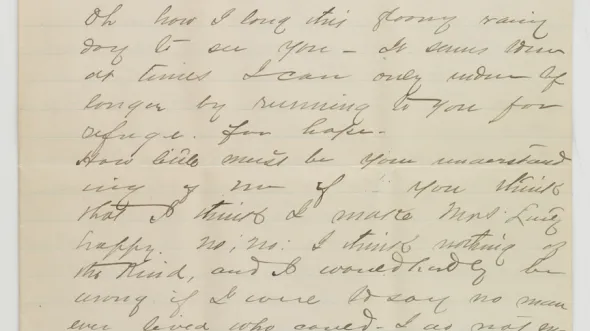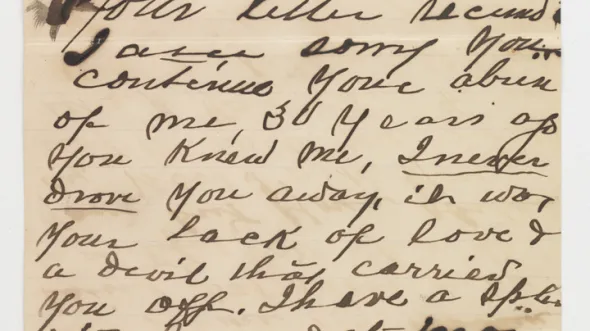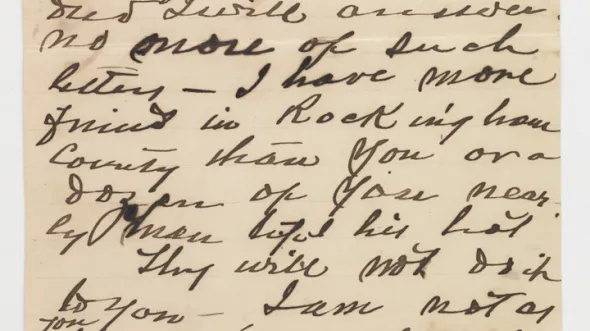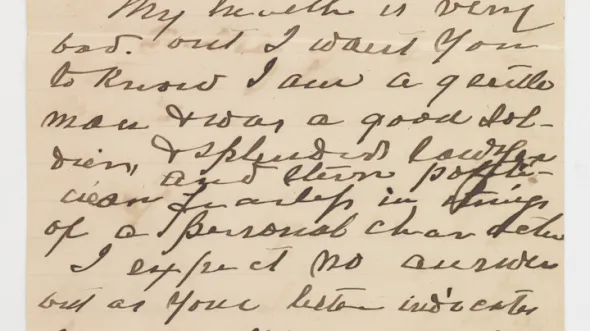The salacious love life of Warren Seymour Lurty, now memorialized in boxes and boxes of letters, proves to us that romance and marriage were as complicated in the past as they are today and that romantic scandal and politics are not just contemporary companions.
Warren Seymour Lurty was born in Clarksburg in what is now West Virginia in 1839, and he married a woman named Mary C. “Minnie” Newman in 1866. His life seems to have been full of excitement from the beginning: he served in the Staunton Artillery and the 19th Virginia Cavalry during the Civil War, where he rose to the rank of captain, and was captured and imprisoned at Fort Delaware. After the war he pursued a career in politics and law, with mixed success. He tried to run for governor in 1897 but failed to receive the Republican Party nomination.
Lurty possessed a flair for dramatic and sentimental language in his love letters. One, dated November 29, 1886, reads:
“I do pray God’s blessing upon you, for if you were to die before me I don’t know what would become of me: how lonesome the world would be without the hope of seeing your dear face.”
He wrote many similar letters from this time period with gushing, adoring praise. The only problem: these letters were not written to his wife, Minnie, but to another woman, Annie Sheppard. Lurty describes first meeting Annie “in the hills of W.Va. when [he] was a boy during the war” and that he was ever looking for her after that point and only married Minnie when “weary and worn.” To make things even more complicated, Warren at one point thanked Annie for the gift she sent to Minnie, indicating that the two women at least knew each other and may have even been friends.
This correspondence with Annie begins in 1884, eighteen years into his marriage to Minnie. We only have the letters that Warren wrote and Annie saved, but we can discern from Warren’s writings that although Warren was head over heels for Annie and desperate to find a way to be with her, Annie had some reservations. Often times, Warren’s letters read like those of a lawyer building a case for himself, trying to break down Annie’s hesitancy toward acting on their illicit romance.
However, Minnie died in 1894, at which point Warren’s letters to Annie immediately begin to discuss the idea of marriage. But with Warren’s first wife out of the picture and marriage now a real possibility, Annie’s reservations seemed only to strengthen. She held concerns about leaving her mother and about Warren himself—specifically his job prospects and his drinking habit. At one point, Annie recommended Warren take drugs that she believed would cure him of his alleged alcoholism, which enraged Warren. He wrote,
“You I have no doubt acted according to your nature, it is a side of it I more had ignored before, or I assure I should never on earth been likely enough to have wanted to marry you. . . . I found my idol of years and years only a human thing and ready to trample the weak and assert power. . . . I commend your conduct and thank God with sincere piety you revealed your . . . disposition before our marriage.” (May 23, 1897)
Surprisingly, Warren and Annie were married a year later. Less surprisingly, their marriage seems to have been troubled from the start. The issue of alcoholism was never resolved, and Warren’s letters became shorter, terser, and more bitter. (Perhaps lending credit to Annie’s claims, his health and handwriting also began to decline steadily.) Though he had written for years that nothing could make him happier than to be with Annie, Warren seemed to have been as disappointed with his marriage to her as he was with his marriage to Minnie. Six years after the wedding, he separated from the woman he had desired for decades. He died two years later in 1906, leaving his entire estate to his housekeeper, a woman named Susie Smith.
To read from decades of Lurty’s letters, visit us in the Research Library.
This article was written by Candice Roland while serving as a library clerk at the Virginia Museum of History and Culture.




